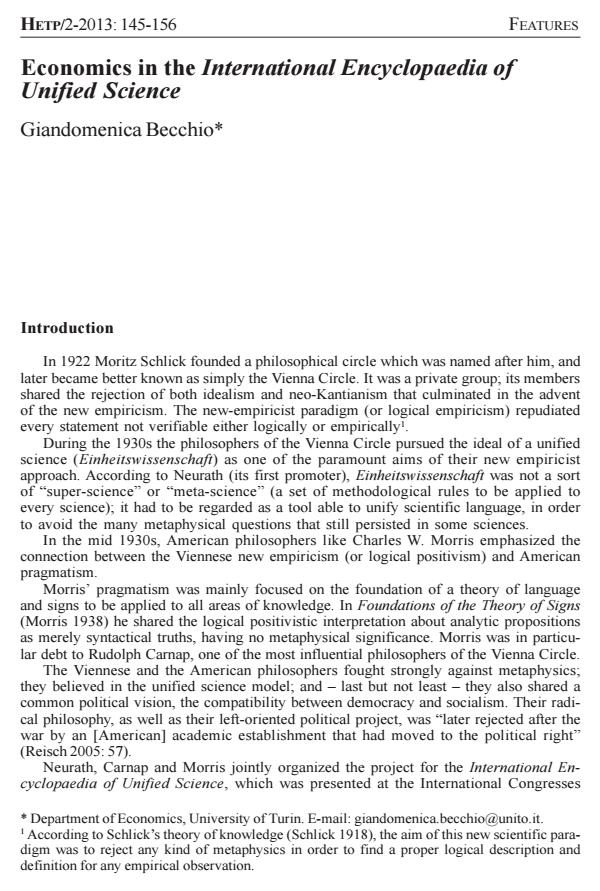Economics in the International Encyclopaedia of Unified Science
Journal title HISTORY OF ECONOMIC THOUGHT AND POLICY
Author/s Giandomenica Becchio
Publishing Year 2013 Issue 2013/2
Language English Pages 9 P. 145-153 File size 42 KB
DOI 10.3280/SPE2013-002007
DOI is like a bar code for intellectual property: to have more infomation
click here
Below, you can see the article first page
If you want to buy this article in PDF format, you can do it, following the instructions to buy download credits

FrancoAngeli is member of Publishers International Linking Association, Inc (PILA), a not-for-profit association which run the CrossRef service enabling links to and from online scholarly content.
The International Encyclopaedia of Unified Science, 1938-1969 (promoted, above all, by Otto Neurath in Vienna and Charles Morris in the United States) was based on the feasibility of building a "unified science" and it was carried on through the publication of a special "encyclopaedia" to show the meaning of this philosophical project. The purpose of this paper is to reconstruct, mainly from a historical point of view, the development of economic theory within this project: from the role of economics inside the Vienna Circle in the 1930s (more specifically in Neurath’s perspective) to the meaning of economics in Tintner’s volume, published in 1968. The role of economics inside the International Encyclopaedia is a part of the story of "the building of the economic "mainstream" (a quantitative and formalist approach to economic issues) during the 1950s and the 1960s in the USA.
Keywords: Unified science, economics, philosophy, Neurath, Tintner
Jel codes: A11, A12, B25, B40
- Stadler F. (2001). The Vienna Circle. Studies in the Origins, Development, and Influence of Logical Empiricism, Vienna-New York, Springer.
- Timms E. and J. Hughes (eds.)(2003). Intellectual Migration and Cultural Transformation. Refugees from National Socialism in the English-Speaking World, Vienna-New York, Springer.
- Tintner G. (1968). Methodology of Mathematical Economics and Econometrics. In The International Encyclopaedia of Unified Science, 2 (6), Chicago, University of Chicago Press.
- Vaughn K. (1994). Austrian Economics in America: The Migration of a Tradition, Cambridge, Cambridge University Press.
- Craver E. (1986). The Emigration of the Austrian Economists, History of Political Economy, 18(1): 1-32.
- Dawson J.W. and K. Sigmund (2006). Gödel’s Vienna, The Mathematical Intelligencer, 28: 44-53.
- Feigl H. (1969). The Wiener Kreis in America. In Fleming and Baylin, (eds.)(1969): 57-93.
- Fleming D. and B. Baylin, (eds.)(1969). The Intellectual Migration, Cambridge (Mass), Harvard University Press.
- Frank P. (1948). The Institute for the Unity of Science, its Background and its Purpose. Synthese, 6 (3/4): 160-167.
- Gibrat R. (1936). La Science économique. Methodes et philosophie. In Actes du congress international de philosophie scientifique, Paris: Hermann &Cle Editeurs: 22-31.
- Hahn H., O. Neurath, and R. Carnap (1929). Wissenschaftliche Weltauffassung. Der Wiener Kreis. Wien: Arthur Wolf Verlag, In Neurath (ed.)(1973): 299-318.
- Janik A. and S. Toulmin (1996[1973]). Wittgenstein’s Vienna, Chicago, Ivan R. Dee, Publisher.
- Lange O. (1942). The Foundation of Welfare Economics. Econometrica, 10(3-4): 215-228.
- Leonard R. (1998). Ethics and the Excluded Middle. Karl Menger and the Social Science in Interwar Vienna. Isis, (89): 1-26.
- Menger K. (1994). Reminiscences of the Vienna Circle and the Mathematical Colloquium, Dordrecht, Kluwer Academic Publishers.
- Menger K. (2009). Unexplored Dimension: Karl Menger on Economics and Philosophy (1923-1938), Bingley (UK), Emerald Group Publishing.
- Menger Karl Papers, Perkins Library, Duke University: Durham, N. C.
- Morris C. (1938). Foundations of the Theory of Signs, Chicago, University of Chicago Press.
- Morris C. (1946). The Significance of Unity of Science Movement. International Phenomenological Society, 6(4): 508-515.
- Morris C. (1960). On the History of the International Encyclopaedia of Unified Science. Synthese, 12 (4): 517-521.
- Morris Charles, Correspondence, Regenstein Library, University of Chicago.
- Nemeth E. and F. Stadler (1996)(eds.) Encyclopedia and Utopia: The Life and Work of Otto Neurath (1882-1945), Wien: Kluwer Academic Publisher.
- Neurath O. (1969[1944]). Foundations of the Social Sciences, Chicago, University of Chicago Press.
- Neurath O. (ed.)(1973). Empiricism and Sociology, Dordrecht, Reidel.
- Neurath O. (2004). Economic Writings. Selection 1904-1945. Dordrecht, Kluwer Academic Publishers.
- Reisch G. (2005). How the Cold War Transformed Philosophy of Science. To the Icy Slope of Logic, Cambridge, Cambridge University Press.
- Richardson A. and T. Uebel (2007). The Cambridge Companion to Logical Empiricism, Cambridge, Cambridge University Press.
- Rutherford M. (2004). Institutional Economics at Columbia University. History of Political Economy, 36(1): 31-75.
- Schlick M. (1918). Allgemeine Erkenntnislehre, Berlin, Springer.
- Soulez A. (1996). Otto Neurath or the Will to Plan. In Nemeth and Stadler (1996)(eds.): 221-232.
- OTTO NEURATH AND THE LINGUISTIC TURN IN ECONOMICS Michael Turk, in Journal of the History of Economic Thought /2016 pp.371
DOI: 10.1017/S1053837216000377
Giandomenica Becchio, Economics in the International Encyclopaedia of Unified Science in "HISTORY OF ECONOMIC THOUGHT AND POLICY" 2/2013, pp 145-153, DOI: 10.3280/SPE2013-002007